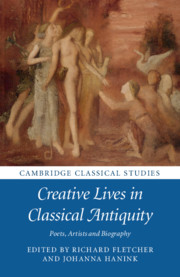Book contents
- Frontmatter
- Contents
- List of contributors
- List of illustrations
- Part I Opening remarks
- Part II Reviving dead poets
- Part III Lives in unexpected places
- Part IV Laughing matters and Lives of the mind
- 8 On bees, poets and Plato: ancient biographers' representations of the creative process
- 9 The life of Aristippus in the Socratic epistles: three interpretations
- 10 Imagination dead imagine: Diogenes Laertius' work of mourning
- Part V Portraits of the artist
- Works cited
- Index
8 - On bees, poets and Plato: ancient biographers' representations of the creative process
from Part IV - Laughing matters and Lives of the mind
Published online by Cambridge University Press: 01 December 2016
- Frontmatter
- Contents
- List of contributors
- List of illustrations
- Part I Opening remarks
- Part II Reviving dead poets
- Part III Lives in unexpected places
- Part IV Laughing matters and Lives of the mind
- 8 On bees, poets and Plato: ancient biographers' representations of the creative process
- 9 The life of Aristippus in the Socratic epistles: three interpretations
- 10 Imagination dead imagine: Diogenes Laertius' work of mourning
- Part V Portraits of the artist
- Works cited
- Index
Summary
Introduction
If there is any consistent feature of European literary history, it is a tendency to try to connect authors closely to their works. Biographers have found it both logical and natural to connect the creative process closely with particular events in an individual life, but quite often tend to overlook other possible sources of influence. It is as if we who are not creative writers cannot imagine that a work of literature, whether prose or poetry, is the product of discipline, deep thinking, extensive knowledge and hard work. The writers themselves share much of the blame for the deficiencies in their biographers’ understanding. Ancient Greek authors usually did not explain in any detail how or why they decided to compose their works. Nor did they discuss how they went about writing them, at least so far as we know from the information that has come down to us. Before Roman times it seems that no ancient Greek wrote anything like what we would now call an autobiography. At least part of the reason was that in literature, as in plastic art, there was a tendency to describe individual experience in generic terms, as if myth were truer than history because it deals with universals, and history with particulars. In order for history to acquire a dimension that was both philosophical and serious, it needed to include some reference, even if indirect, to the truth (alētheia) conveyed in myth. As Aristotle said, poetry (poiēsis) is a more philosophical and serious matter than historical inquiry (historia; Poet. 1451b). It may also be the case, as Wilamowitz suggested, that the Greeks’ reluctance to describe a person as a whole was somehow connected with their practice of not taking into account the impersonal forces that bring about historical actions. No wonder, then, that their biographers needed to turn to such information as they did have, the works of individual authors, and what other writers, such as Aristophanes, might have said about them.
Creating literary biography with such limited resources required both close reading and an active imagination. Because of the restricted nature of the evidence at their disposal, biographers were confronted with many challenges, not the least of which was providing their audiences with plausible explanations of how authors came to write what they did, and how they became authors in the first place.
- Type
- Chapter
- Information
- Creative Lives in Classical AntiquityPoets, Artists and Biography, pp. 177 - 197Publisher: Cambridge University PressPrint publication year: 2016
- 1
- Cited by

